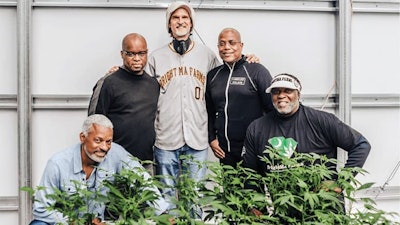
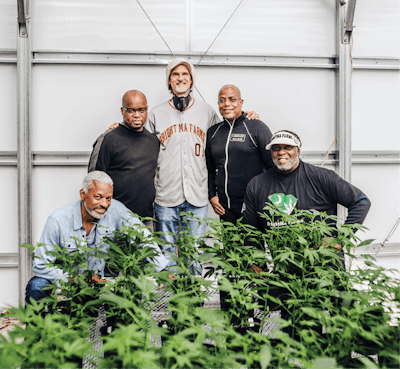
While stationed at the Schofield Barracks U.S. Army base in Hawaii in the early 1990s, Harold Singletary received a call from his mother, Anna Delores Singletary. She told him that an author, Edward Ball, had uncovered information about the Singletarys’ ancestors.
Ball, a descendant of slaveholders, wrote about the history he unearthed. His story included the lives of the Singletarys’ forebearers, who were slaves to the Ball family.
“My mom called me and said, ‘Wow, all of this history is coming out,’” Harold Singletary says, adding that it can be difficult for many African Americans to trace their family histories.
Singletary’s family members, including his late grandmother, Katie Roper, spoke with the author in the ’90s, sharing oral history and information from documents such as labor contracts, as cited in Ball’s book, “Slaves in the Family.” When Katie Roper was about 10, her grandmother and namesake, Katie Heyward, reenacted for her granddaughter how she ran into a river to escape a beating while she was enslaved.
“She ducked in the water, and swam,” Roper told Ball. “I got excited, and started crying. And I screamed murder! I said, ‘Oh Lord, the ’gators going to eat her!’”
Heyward, also known as “Bright Ma” for reasons that have been lost to history, was forced to work in the field, likely growing rice, on the Balls’ Comingtee Plantation in Berkeley County, S.C. When she was freed in 1865, she settled on a 10-acre plot of land in Cordesville, S.C.
Today, Harold Singletary runs his hemp business—BrightMa Farms—on that land in Cordesville. It’s where ancestors between him and Bright Ma in the family lineage grew food for sustenance and near where they fished commercially. It’s near where his grandmother became fearful of water after Bright Ma jumped in the river.
“It’s been in my family for many, many years,” Singletary, BrightMa Farms’ founder and CEO, says of the land he inherited from Roper. “I’m just happy—it meant a lot to my grandmother. She would take her little bit of change and pay the property taxes. And I never wanted to lose it once she left it to me.”
With hemp, Singletary, an accountant and entrepreneur in the financial sector, is growing a plant that he says helps both people and the earth heal—and which can allow Black farmers and other farmers of color to create generational wealth and thrive.
BrightMa Farms runs a 3,000-square-foot headhouse and 7,200-square-foot greenhouse on the land in Cordesville and has offices in Charleston, S.C. The licensed nursery propagates a variety of hemp cultivars used for cannabinoid, grain and fiber production, and then sells the rooted clones to growers for them to mature and sell on a large scale. BrightMa also advises those growers through harvest. In addition to its cloning operations, BrightMa also breeds hemp, conducts research and development, and grows boutique smokable flower.
One of Singletary’s overarching goals is creating a global circular economy focused on reducing waste by incorporating hemp as a sustainable alternative for other materials, such as tree-sourced paper and synthetic plastics, and then either processing it at BrightMa Farms or selling it to another processor.
“My [customer] farmers and minority farmers will always have a value proposition within my circular economy,” Singletary says. “I will provide them genetics, I will provide them the understanding of how to grow, and we will process and then everyone will win. But there need to be more opportunities where we can be positioned to have not just a farm but processing capabilities and other components within the supply chains to be successful.”
To that end, Singletary says BrightMa Farms aims to buy product back from the growers it works with and process it for a variety of end uses, such as textiles, “advanced material composites” for the automotive sector, and plant-based foods.
Other opportunities include biofuels, batteries and aeronautical composites, Singletary says, commenting that President Joe Biden’s administration has ordered a review of multiple industrial supply chains to decrease U.S. reliance on China and other foreign countries. “The verticals are unlimited,” Singletary says of hemp. “We like to say it’s a plant of unlimited opportunities.”
“We like to say it’s a plant of unlimited opportunities.” – Harold Singletary, founder and CEO, BrightMa Farms
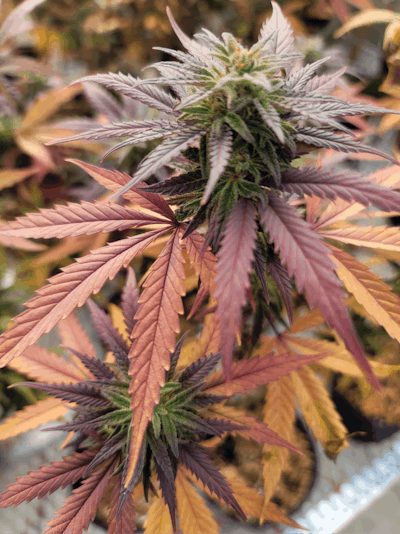
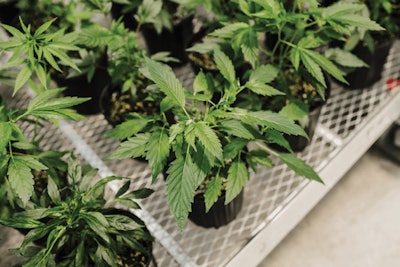
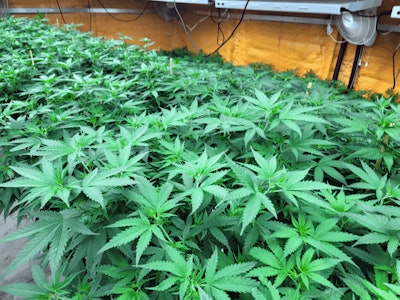
The Business's Early Days
Singletary, who is from Charleston, grew up working on a farm owned by his grandparents, Katie and Ned Roper, on James Island, S.C.
“It’s a hard life,” he says. “To do large-scale farming—I never wanted to do that at all. I’m an accountant by trade. I wanted to understand business and finance. That allowed me to structure, raise capital, use a network and also create a different solution to farm, which was indoor farming.”
A desire to help create opportunities for African American farmers, plus a few other experiences, inspired Singletary to enter the hemp marketplace.
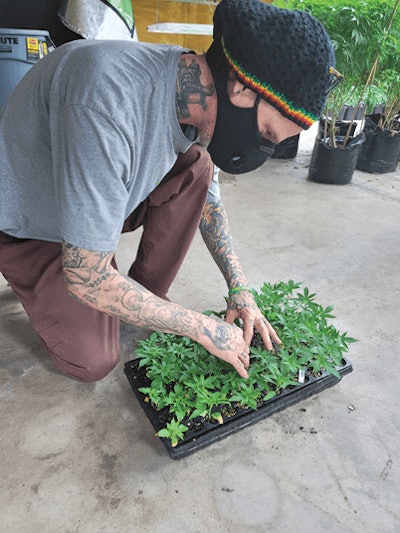
For one, his mother, Anna Delores, suffered from bone cancer. She received two bone marrow transplants but ultimately lost her battle with the disease in 2016. When she was still alive, Singletary provided her with cannabidiol (CBD) and tetrahydrocannabinol (THC), which he says allowed her to retain a better quality of life than prescription opioids did.
Hemp and cannabis also helped Singletary deal with anxiety and post-traumatic stress disorder (PTSD) from his U.S. Army infantry enlistment. He was deployed to Haiti for six months in 1995 as part of Operation Uphold Democracy, for which he received an Armed Forces Expeditionary Medal. He entered conflict zones and other dangerous situations where he fired weapons and witnessed casualties. “Even any soldier being put into any warfare or heavy, stressful situations—you will acquire anxiety or PTSD,” he says. “Then, trying to come back out of those types of situations ... into a normal society—and adapt to what may not be intense anymore—how do you navigate that?”
Another impetus behind the business was a collection of positive family experiences. Singletary’s wife, Shanequa Renee Singletary, is a certified herbalist. She owns a company called Four Room Herbals, referencing the body’s four “rooms” of mental, physical, emotional and spiritual wellness, and works with herbs such as elderberry, aloe and lavender. Harold Singletary says he and his family use herbal products and find that they provide them with health benefits. “We come from people that treated themselves holistically with natural herbs,” he says, zeroing in on hemp: “This plant is a natural, God-given miracle plant.”
In 2017, Singletary and his team put together a vision board for their company, which they originally called Lowcountry Hemp Extracts, and intended to focus solely on cannabinoid production. They started growing in 2018 under South Carolina’s industrial hemp pilot program, which the state had launched the previous year.
The company made some alterations as the team expanded its vision to include the fiber and grain side of the hemp industry in addition to on the cannabinoid front. Reassessing the company name, Singletary looked to the land he had inherited from generations of farmers. “My ancestors were with me,” he says, “and ‘BrightMa’ just felt great because her hands were first in the soil.”
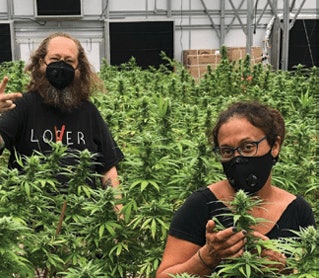
As for that vision board of which Singletary speaks, his associate Sherman Evans says the founder maintains a physical board. “He’s got it all up there,” Evans says.
Evans, a serial entrepreneur, previously owned and operated retail businesses, serving as marketing director at NuSouth Apparel and marketing and sales director for Vertical Records before joining BrightMa Farms as director of sales and marketing.
Both Evans and Singletary see opportunities for replacing toxic materials with hemp-based inputs. Singletary says hemp fiber cultivars can be used to create cellulose- and lignin-based batteries and plastics.
In these early days of the newly reestablished legal hemp industry, much of the market has been heavily focused on CBD, Evans points out. “That has been the buzzword, and that has been ... where even a lot of our farmers got sucked into this gold rush,” he says. “We really took a deeper dive, and … we were fortunate in a lot of ways. We got exposed [to] and got the opportunity to start working in the fiber space.”
Growing for Good
On the cultivation front, BrightMa Farms works with larger-scale Black hemp farmers to hold onto family properties that extend back generations, despite farming’s inherent risks, says BrightMa Farms’ director of cultivation, Brandon Hudson.
Crops can fail from extreme weather, such as torrential rains and hurricanes that batter the coast, Hudson says, adding that has been the case with crops that are harvested for their fruit, as well as cannabinoid hemp. The financial consequences can be severe.
“Then you’ve lost your family’s property; you’ve lost property that your family died on ...,” Hudson says, but touching on the financial promise of the hemp industry, he adds: “Hemp gives us some opportunities to hold onto this property, hold onto it as a single unit, hold onto it for generational wealth and productivity.”
Between all the farms BrightMa sells clones to and those it consults with and visits, the company has access to more than 5,000 acres of farmland. It is expanding its network in part because of connections Singletary has made as treasurer of the U.S. Hemp Growers Association—a position he started this year after joining the group’s board of directors in 2020.
Hudson says he prefers outdoor growing for fiber and grain production in South Carolina rather than growing hemp for cannabinoids outdoors because of the unstable climate.
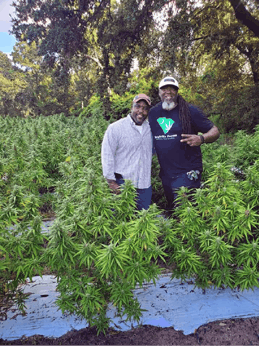
However, with the Propel Center's consortium of Historically Black Colleges and Universities [HBCUs] and BrightMa's strategic partners Puregene AG (a Switzerland-based research and breeding company) and US Nursery (hemp clone and seed provider), Singletary says, "We look to dial in on data-driven variety and cannabinoid development that will not make this a concern for future farmers."
Good genetics can mitigate negative situations for farmers in the field. BrightMa Farms has its own breeding programs and has developed six smokable cultivars, Singletary says, with grain and fiber cultivars added this year. It’s now conducting an industrial hemp trial with South Carolina State University and partnering with Puregene AG.
It's important to pay attention to quality genetics, Hudson says; however, they can still be hard to come by, given the setbacks caused by more than 80 years of cannabis prohibition in the U.S.
Hudson says BrightMa Farms uses a “controlled pollen exchange” to breed for specific cannabinoid and terpene attributes, as well as resistance against pests and diseases and severe weather conditions.
“We run all of our cultivars in the field as well as indoors,” Hudson says. “Our personal flower is produced in our greenhouses so that we can produce the best quality ... hemp that we can. With that said, it is crucial in serving client farms and strategic partners that we can set them up for success, so we do the outdoor runs to be sure the cultivar can handle coastal conditions.”
Looking back, Hudson says he remembers thinking, Where am I supposed to get these invisible, mysterious genetics?
“Luckily, with some of the contacts in the hemp world, I’ve been able to get some really interesting stuff,” Singletary says.
Even within a specific type of genetics, Hudson compares the lifecycle and the needs of plants to those of humans. For example, preteens, middle-aged adults and elderly people will all need to eat differently, engage in different activities and sleep for different lengths of time.
It’s also imperative that growers keep a healthy mother stock, Hudson says. “You’ve got to keep that clean and healthy because it drives everything else that we do, whether it’s providing cuttings for other farmers as a nursery, whether that is producing our own flower to sell or to do extraction with and make other products,” he says. “It all starts with the moms.”
To establish a clean growing environment, even before COVID-19, Hudson required team members to wear scrubs, wash their hands with alcohol and wear bleach-dipped rubber slides. They also need to follow internally established standard operating procedures (SOPs). “We have strict SOPs for all aspects of our cultivation, whether that is IPM [integrated pest management], fertigation, harvest, cure, or propagation,” Hudson says.
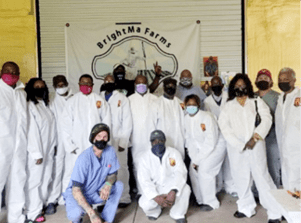
Connections are also essential to the farm’s success. Hudson says he has numerous connections in the cannabis industry and is an organic gardener outside of BrightMa Farms. At the same time, he points to connections Singletary has with South Carolina State University and other HBCUs and land-grant universities, as well as organizations like the nonprofit Lowcountry Local First. Hudson says the circular economy will grow as BrightMa Farms provides “information, education [and] advocation” to more farmers of color.
“I’m very excited to keep moving forward with our team and trying to make inroads in the business world with this and be successful, but also really try to navigate all the social equity and sustainability and environmental impacts that we could have with this,” Hudson says.
But there are challenges associated with expanding a U.S.-based business into a global hemp circular economy. For example, there’s a lack of robust processing infrastructure in the U.S. There’s also the requirement that all hemp—not just that grown for cannabinoids or smokable flower—must be tested to ensure its THC content doesn’t exceed the 0.3% legal limit.
“Imagine, now, if I’m out here and I’m running 200 acres, and they decide to randomly come out and pick from a particular spot in my farm and it pops hot, I have to destroy my entire 200 acres,” Evans says. “That is catastrophic.”
It’s one of the reasons BrightMa Farms plans to work with partners like the Propel Center, a newly established educational hub, on projects such as determining which genetics work for which environments. “I think with any emerging space, you have to have the institution of higher learning partnerships for success,” Evans says.
Forging Connections
The Propel Center, founded by Ed Farm, the educational nonprofit behind the center’s concept and design—along with $25 million investments from Apple and Southern Company, a leading energy company serving people in three states—will service more than 100 HBCUs and provide students with in-person education at its Atlanta University Center Consortium as well as virtual learning.
Together with Ed Farm, as part of the Propel Center’s AgriTech program, BrightMa Farms will teach Black farmers about hemp production and research, says Singletary, who attended HBCU Livingstone College in Salisbury, N.C. “Hemp could be the igniter to change the narrative for Black farmers,” he says.
In part through using resources from and working with the team at BrightMa Farms, the Propel Center will work to bring equitable opportunities for Black students and professionals to participate in the hemp supply chain, says Inga Willis, director of strategic partnerships at Ed Farm.
The partnerships come a time when the Biden administration is pledging $5 billion in stimulus funding for Black farmers and proposing the U.S. Department of Agriculture (USDA) purchase carbon credits from farmers. The Propel Center's founding partners Apple and Southern Company have expressed interest in promoting carbon neutrality in farming and serving underserved communities, Willis says.
Of Apple and Southern Company’s involvement, she says, “It was just a perfect fit because we wanted to bring education technology to this sphere of agriculture and really inspire students who come from a legacy of agriculture, but honestly, go away to get educated and don’t return to their homes because they don’t necessarily want to be farmers. I believe that hemp is changing that desire.”
Willis, a graduate of Howard University (an HBCU in Washington, D.C.) who sits on the board of the U.S. Hemp Growers Association with Singletary, says she predicts the hemp market will continue to provide many new opportunities within the farming sphere, noting that “those opportunities have to be met with training and students becoming equipped to become the workforce of the future.”
With the numerous HBCUs participating in the Propel Center’s programming, Willis says students can find various opportunities there, including mentorships, internships, jobs and accelerators.
Innovating Disruption
Eager to disrupt global supply chains via hemp production, Singletary says establishing and expanding various partnerships in the circular economy can reverse the stigma that surrounds the plant.
“We need to have more synergy in our approach to changing that narrative,” he says. “I’m excited that BrightMa Farms has been at the front of it as a stakeholder by opening doors to ignite imaginations. Our goal is to have a global footprint. BrightMa Farms will eventually be back in Africa.”
However, hurdles remain. For example, BrightMa Farms produces boutique smokable flower, but it needs to either send the flower to a processor or to ecommerce customers out of state, as South Carolina has banned smokable hemp. In 2020, Singletary says the business produced 1,000 pounds of smokable flower.
As it deals with challenges on various fronts, the business will continue to honor Singletary’s family history. “We actually have a strain in our house called Anna D,” Singletary says, explaining that it’s named after his mother. “It’s a CBG [cannabigerol] strain, and we’re excited about that; it’s something that Brandon came up with in the lab.”
Singletary shares that his experience has felt “surreal, being able to try to create this generational wealth opportunity with land that wasn’t bequeathed so positively.” He’s glad to now support growers of color so they can provide for their own family and heirs. “My blueprint will be replicated,” he says. “Like minds do powerful things.”
















